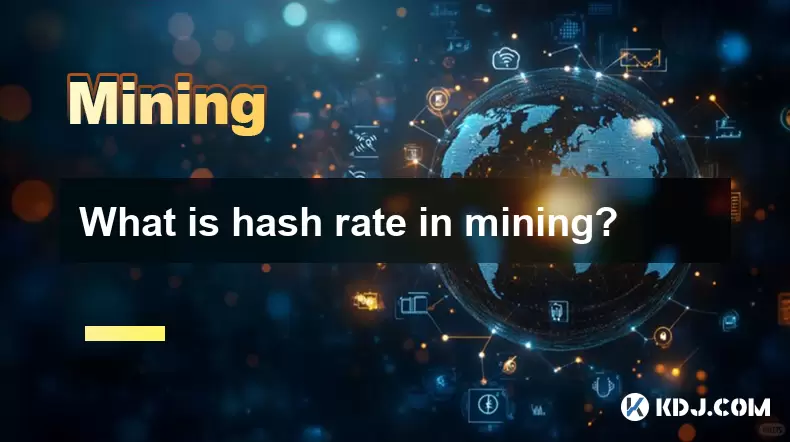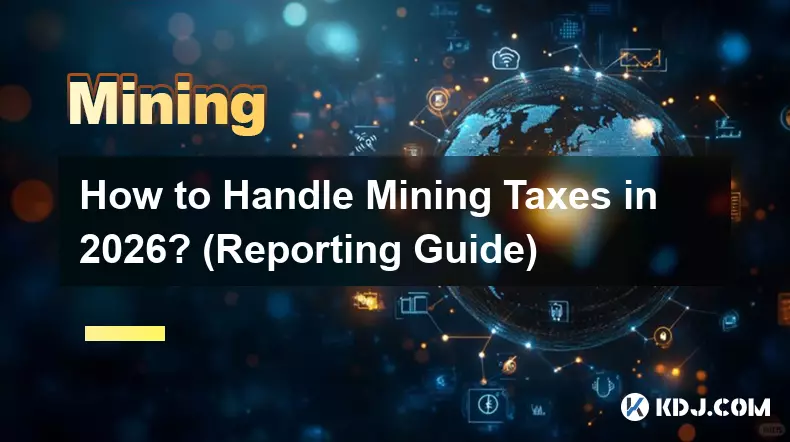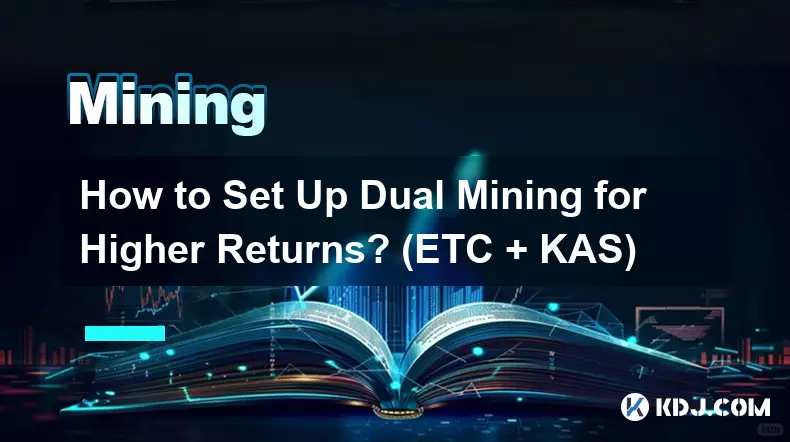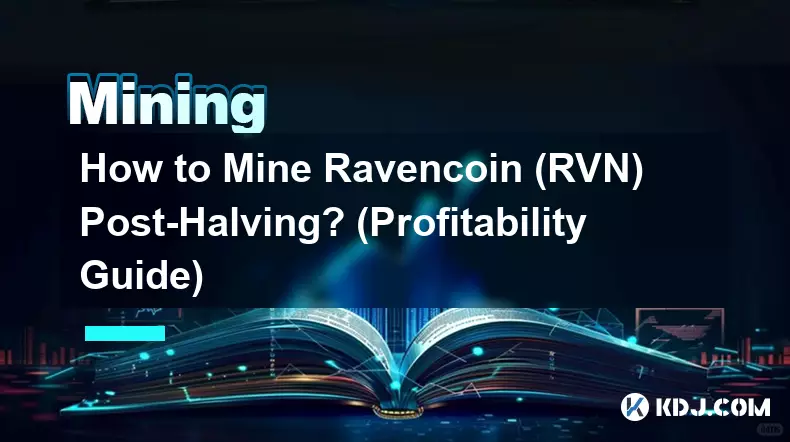-
 bitcoin
bitcoin $87959.907984 USD
1.34% -
 ethereum
ethereum $2920.497338 USD
3.04% -
 tether
tether $0.999775 USD
0.00% -
 xrp
xrp $2.237324 USD
8.12% -
 bnb
bnb $860.243768 USD
0.90% -
 solana
solana $138.089498 USD
5.43% -
 usd-coin
usd-coin $0.999807 USD
0.01% -
 tron
tron $0.272801 USD
-1.53% -
 dogecoin
dogecoin $0.150904 USD
2.96% -
 cardano
cardano $0.421635 USD
1.97% -
 hyperliquid
hyperliquid $32.152445 USD
2.23% -
 bitcoin-cash
bitcoin-cash $533.301069 USD
-1.94% -
 chainlink
chainlink $12.953417 USD
2.68% -
 unus-sed-leo
unus-sed-leo $9.535951 USD
0.73% -
 zcash
zcash $521.483386 USD
-2.87%
What is hash rate in mining?
A higher hash rate boosts mining success but demands more energy, making hardware efficiency and electricity costs crucial for profitability.
Jul 16, 2025 at 07:35 am

Understanding the Concept of Hash Rate in Cryptocurrency Mining
Hash rate is a fundamental term in cryptocurrency mining that refers to the computational power used by miners to process transactions and secure blockchain networks. In simple terms, it measures how many calculations a mining machine can perform per second when solving cryptographic puzzles required for block validation. The hash rate directly affects the speed and efficiency of mining operations.
Cryptocurrencies like Bitcoin, Ethereum (before proof-of-stake), and Litecoin rely on proof-of-work (PoW) consensus mechanisms. Under this model, miners compete to solve complex mathematical problems using hashing algorithms such as SHA-256 or Ethash. The miner who solves the puzzle first gets the right to add a new block to the blockchain and earns rewards in return.
Higher hash rates imply more computational effort being applied to the network, increasing the chances of successfully mining a block.
How Hash Rate Affects Mining Difficulty
The hash rate of a network is closely tied to its difficulty level, which adjusts periodically to maintain consistent block times. For example, Bitcoin's difficulty changes every 2016 blocks to ensure that blocks are mined approximately every 10 minutes. When more miners join the network and the total hash rate increases, the system automatically raises the difficulty level to keep up with the added computing power.
Conversely, if miners leave the network and the overall hash rate drops, the difficulty decreases accordingly. This dynamic adjustment ensures stability and prevents rapid inflation of newly minted coins.
- The hash rate determines how quickly a miner can attempt different nonces to find a valid solution.
- A rising hash rate makes mining more competitive and resource-intensive.
- Miners must constantly upgrade their hardware to stay profitable amid increasing difficulty levels.
Different Units Used to Measure Hash Rate
Since modern mining equipment performs billions—or even trillions—of hash operations per second, measuring hash rate requires large units. Here are the most commonly used ones:
- H/s (Hash per second): Refers to one calculation per second.
- KH/s (Kilohash per second): Equals 1,000 hashes per second.
- MH/s (Megahash per second): Equals 1,000,000 hashes per second.
- GH/s (Gigahash per second): Equals 1,000,000,000 hashes per second.
- TH/s (Terahash per second): Equals 1,000,000,000,000 hashes per second.
- PH/s (Petahash per second): Equals 1,000,000,000,000,000 hashes per second.
- EH/s (Exahash per second): Equals 1,000,000,000,000,000,000 hashes per second.
For instance, top-tier Bitcoin mining rigs today operate at the TH/s or even PH/s level. Meanwhile, smaller altcoins may still be mined efficiently with devices rated in MH/s or GH/s.
Hardware Impact on Hash Rate and Mining Efficiency
The type of mining hardware used significantly influences the hash rate a miner can achieve. Over time, mining has evolved from CPU-based systems to GPUs, FPGAs, and finally ASICs (Application-Specific Integrated Circuits), each offering higher performance and energy efficiency.
- CPU Mining: Early Bitcoin mining was done using CPUs, which offered low hash rates and were inefficient compared to later technologies.
- GPU Mining: Graphics Processing Units became popular due to their ability to handle parallel processing better than CPUs, leading to higher hash rates.
- FPGA Mining: Field Programmable Gate Arrays provided customizable circuitry, allowing better performance than GPUs but lacked widespread adoption.
- ASIC Mining: These are specialized chips designed specifically for mining cryptocurrencies. They offer the highest hash rates and power efficiency currently available.
Choosing the right hardware depends on the target cryptocurrency, electricity costs, and expected return on investment. It’s essential to compare hash rate output against power consumption to calculate profitability accurately.
Monitoring Hash Rate: Tools and Platforms
Tracking your mining rig’s hash rate is crucial for optimizing performance and identifying issues. Most mining software comes with built-in tools to display real-time hash rate statistics. Additionally, third-party platforms and mining pools provide dashboards where users can monitor their contributions and earnings.
Popular mining software includes:
- CGMiner
- BFGMiner
- Awesome Miner
These programs allow users to configure settings, monitor hash rate, and receive alerts if performance drops unexpectedly.
Mining pools also play a role in tracking collective hash rate. When joining a pool, individual miners contribute their hash rate to the group effort, and rewards are distributed based on each member’s contribution.
Some online services like WhatToMine, CryptoCompare, and NiceHash offer calculators where users can input their device’s hash rate, power consumption, and local electricity cost to estimate potential profits.
Frequently Asked Questions (FAQs)
Q1: Can I increase my hash rate without upgrading hardware?Yes, you can optimize your current setup by adjusting overclocking settings, improving cooling systems, and ensuring stable power supply. However, these tweaks have limits and may not significantly boost your hash rate beyond hardware capabilities.
Q2: Does internet speed affect hash rate?No, hash rate is determined by your mining hardware’s processing power, not your internet connection. However, a slow or unstable connection might cause delays in submitting shares to a mining pool, affecting reward distribution.
Q3: What happens if my hash rate drops suddenly?A sudden drop in hash rate could indicate overheating, power supply issues, outdated firmware, or software glitches. Check temperatures, ensure proper ventilation, and update your mining software to resolve the issue.
Q4: Is a higher hash rate always better?While a higher hash rate improves your chances of mining blocks, it often requires greater energy consumption. Balancing hash rate with power efficiency and cost is key to maintaining profitability.
Disclaimer:info@kdj.com
The information provided is not trading advice. kdj.com does not assume any responsibility for any investments made based on the information provided in this article. Cryptocurrencies are highly volatile and it is highly recommended that you invest with caution after thorough research!
If you believe that the content used on this website infringes your copyright, please contact us immediately (info@kdj.com) and we will delete it promptly.
- Bitcoin's Rocky Road: Inflation Surges, Rate Cut Hopes Fade, and the Digital Gold Debate Heats Up
- 2026-02-01 09:40:02
- Bitcoin Shows Cheaper Data Signals, Analysts Eyeing Gold Rotation
- 2026-02-01 07:40:02
- Bitcoin's Latest Tumble: Is This the Ultimate 'Buy the Dip' Signal for Crypto?
- 2026-02-01 07:35:01
- Big Apple Crypto Blues: Bitcoin and Ethereum Stumble as $500 Billion Vanishes Amid Macroeconomic Whirlwind
- 2026-02-01 07:35:01
- Michael Wrubel Crowns IPO Genie as the Next Big Presale: A New Era for Early-Stage Investments Hits the Blockchain
- 2026-02-01 07:30:02
- XRP, Ripple, Support Level: Navigating the Urban Jungle of Crypto Volatility
- 2026-02-01 06:35:01
Related knowledge

How to Handle Mining Taxes in 2026? (Reporting Guide)
Feb 01,2026 at 01:39am
Tax Classification of Mining Rewards1. Cryptocurrency mining rewards are treated as ordinary income at the fair market value on the date of receipt. 2...

How to Start Solo Mining and Win a Block Reward? (High Risk/Reward)
Feb 01,2026 at 06:40am
Understanding Solo Mining Mechanics1. Solo mining means operating a full node and attempting to solve cryptographic puzzles independently without join...

How to Set Up Dual Mining for Higher Returns? (ETC + KAS)
Feb 01,2026 at 02:19am
Dual Mining Fundamentals1. Dual mining allows a single GPU to simultaneously contribute computational power to two different blockchains using compati...

How to Mine Alephium (ALPH) with High Efficiency? (Next-Gen Mining)
Feb 01,2026 at 05:39am
Understanding Alephium's Unique Consensus Mechanism1. Alephium employs a sharded Proof-of-Work (PoW) consensus called BlockDAG with Recursive Sharding...

How to Mine Ravencoin (RVN) Post-Halving? (Profitability Guide)
Feb 01,2026 at 07:59am
Understanding Ravencoin Mining Mechanics1. Ravencoin operates on a proof-of-work consensus model using the KAWPOW algorithm, specifically designed to ...

How to Set Up HiveOS for Remote Rig Management? (Tutorial)
Feb 01,2026 at 12:39am
Understanding HiveOS Fundamentals1. HiveOS is a Linux-based operating system specifically engineered for GPU mining rigs, offering lightweight perform...

How to Handle Mining Taxes in 2026? (Reporting Guide)
Feb 01,2026 at 01:39am
Tax Classification of Mining Rewards1. Cryptocurrency mining rewards are treated as ordinary income at the fair market value on the date of receipt. 2...

How to Start Solo Mining and Win a Block Reward? (High Risk/Reward)
Feb 01,2026 at 06:40am
Understanding Solo Mining Mechanics1. Solo mining means operating a full node and attempting to solve cryptographic puzzles independently without join...

How to Set Up Dual Mining for Higher Returns? (ETC + KAS)
Feb 01,2026 at 02:19am
Dual Mining Fundamentals1. Dual mining allows a single GPU to simultaneously contribute computational power to two different blockchains using compati...

How to Mine Alephium (ALPH) with High Efficiency? (Next-Gen Mining)
Feb 01,2026 at 05:39am
Understanding Alephium's Unique Consensus Mechanism1. Alephium employs a sharded Proof-of-Work (PoW) consensus called BlockDAG with Recursive Sharding...

How to Mine Ravencoin (RVN) Post-Halving? (Profitability Guide)
Feb 01,2026 at 07:59am
Understanding Ravencoin Mining Mechanics1. Ravencoin operates on a proof-of-work consensus model using the KAWPOW algorithm, specifically designed to ...

How to Set Up HiveOS for Remote Rig Management? (Tutorial)
Feb 01,2026 at 12:39am
Understanding HiveOS Fundamentals1. HiveOS is a Linux-based operating system specifically engineered for GPU mining rigs, offering lightweight perform...
See all articles





















![THIS IS THE HARDEST COIN TO GET [POLY DASH] THIS IS THE HARDEST COIN TO GET [POLY DASH]](/uploads/2026/01/31/cryptocurrencies-news/videos/origin_697e0319ee56d_image_500_375.webp)




















































